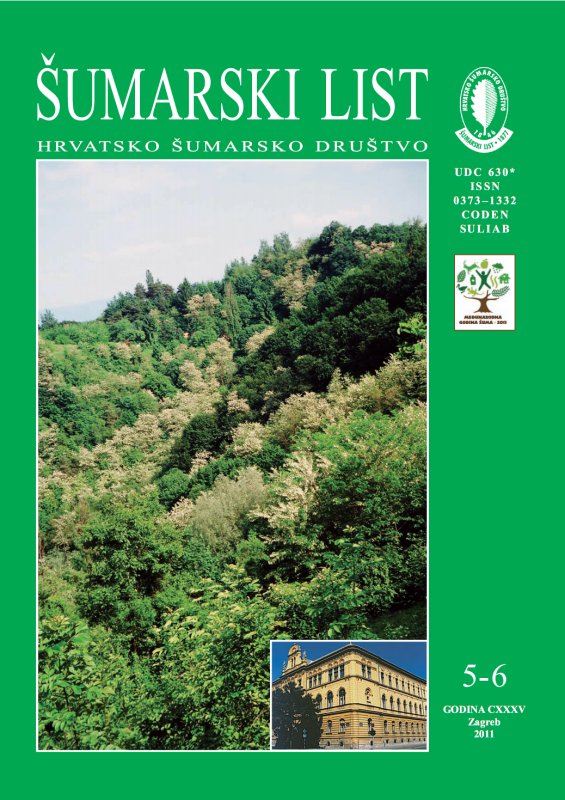
broj: 5-6/2011
pdf (7,5 MB) |
|
||||||||||||||
| RIJEČ UREDNIŠTVA | ||
| Uredništvo | ||
| DEVELOPMENTAL STRATEGY (STRATEGIES) pdf HR EN | 213 | |
| IZVORNI ZNANSTVENI ČLANCI | ||
| Kutnar,L., D. Matijašić, R. Pisek | UDK 630* 907 : 629 + 114.4 (001) | |
| Conservation Status and Potential Threats to Natura 2000 Forest Habitats in Slovenia pdf HR EN | 215 | |
| Lubojacký,J., J. Holuša | UDK 630* 453 (001) | |
| Comparison of Spruce Bark Beetle (Ips typographus) Catches Between Treated Trap Logs and Pheromone Traps pdf HR EN | 233 | |
| PRETHODNO PRIOPĆENJE | ||
| Posavec,S., M. Šporčić, D. Antonić, K. Beljan | UDK 630* 649 | |
| Inovation Fostering – Key Factor of Development in Croatian Forestry pdf HR EN | 243 | |
| Planinšek,Š., A. Ferreira, A.Japelj | UDK 630* 116 + 907 | |
| A Model for Evaluation of the Hydrological Role of a Forest pdf HR EN | 257 | |
| STRUČNI ČLANCI | ||
| Poljak,I., M. Idžojtić, M. Zebec | UDK 630* 174 + 652 | |
| Woody Plants of the Zagreb Zoo Garden pdf HR EN | 269 | |
| Domac, J., Z. Benković, V. Šegon, I. Ištok | UDK 630* 537 + 741 | |
| Critical Factors in Developing National Pellet Market pdf HR EN | 281 | |
| Summary: The quality of raw material, as well as tradition in wood processing and pronounced trends of increased use of wood residues as a renewable and organic material play an important role in expansion of national pellet industry and market. Although dependent on market demand and economic feasibility in relation to non-renewable energy sources, renewable energy sources can and must be exploited in a better and more effective way. The use of wood pellets as fuel for domestic stoves and boilers and for cofiring in thermal power plants has been an amazing success story over the past 20 years. Socio-economic impact studies are commonly used to evaluate the local, regional and/or national implications of implementing particular development decisions. Typically, these impacts are measured in terms of economic variables, such as employment, revenue and taxes, but a complete analysis must also include social, cultural and environmental issues. In many ways the social implications arising from local pellets production or any bioenergy activity represents the less clear and concrete end of impact studies; nevertheless they can be broken down into two categories: those relating to an increased standard of living and those that contribute to increased social cohesion and stability. The primary instruments for the development of renewable energy technologies across the world are international carbon reduction policy drivers. But the development of one type of technology over another on national, regional or local level is often a function of the intricate balance of socio-economic factors in that particular geographical location. The development of wood pellet markets has been very strong in some coutries and almost non-existent in others. Based on these considerations, this paper is primarily focused on investigating the critical socio-economic factors in developing national pellet markets. Examples from Austria, Ireland and Croatia highlight some of the key factors that influenced the development and pellet market situation in these countries. Based on initial review, current situation and analysis of these markets, this paper defines critical factors that influence development of national pellet market. Critical socio-economic factors for the development of national pellet market resulting from presented analysis are the following: • Financial incentives for investing in wood pellet heating rapidly increase uptake even when pellets are competitive with alternative fuels; • The existence of a strong sawmilling industry to provide, at least initially, a low cost and readily available source of raw material; • Stringent quality and sustainability requirements for pellet boilers with regard to emissions, efficiency and security – poor products can permanently damage the market, trigger serious environmental concerns and cause major functional problems;• • Establishment of effective quality control mechanisms for wood pellets. Establishment of national or international tracking systems that allow identification of the origin of pellets; • Dedicated educational programs and certification of installers establishing pellet heating systems.; • Linking of subsidies with quality requirements for boilers and certification of installers; • Procurement of wood pellet heating in public buildings to provide user confidence and to stimulate the supply chain; • Development of incentives for energy service companies to enter into the biomass heating market. In conclusion, looking at the overall situation regarding pellets production and utilisation a strong growth can be expected with political support at the EU level, playing a major role for the extension of the pellet industry into new member states in particular. The ambitious EU target of achieving 20 % of energy supply from renewable energy by the end of 2020 is impossible without dedicated policies to develop renewable heating. In addition, the on-going oil price rally and carbon dioxide reduction targets also encourage the expansion of the markets for pellets. Key words: market; pellets; renewable energy sources; socio-economic factors; market; pellets; renewable energy sources; socio-economic factors | ||
| ZNANSTVENI I STRUČNI SKUPOVI | ||
| Tomljanović, Kristijan | ||
| Populationsökologie von Raubsäusgarten PDF | 308 | |


